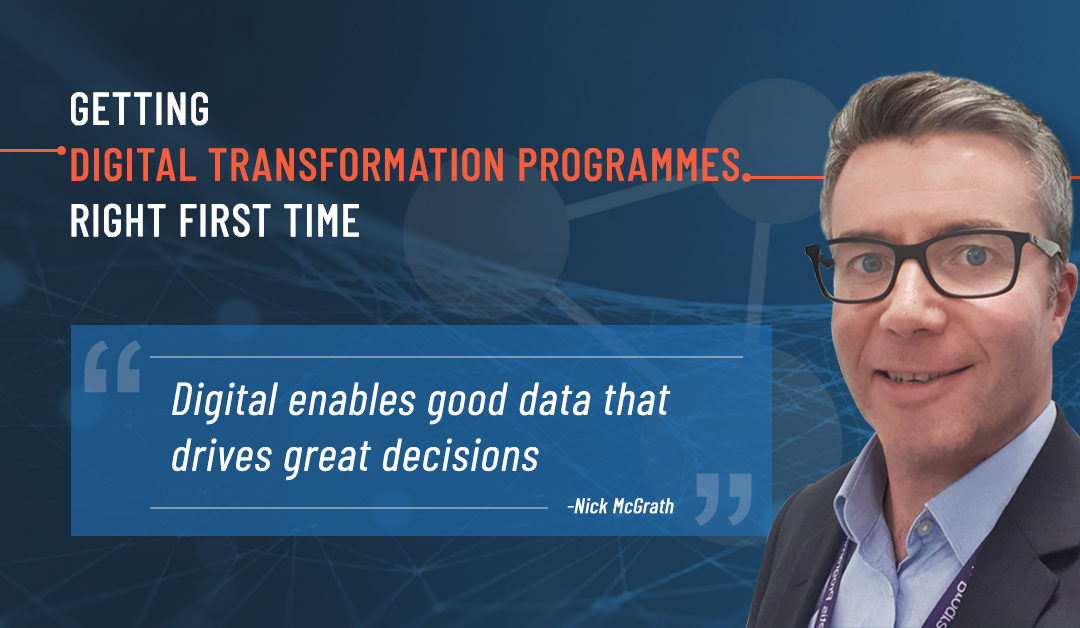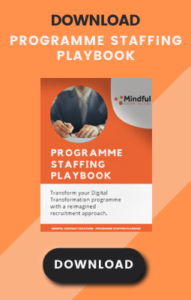In part 1, which focuses on building the right strategy for your Digital Transformation Programme, Nick explains the importance of informing government decision making based on good data.
In August, Nick McGrath, Director of the MyCO Programme, spoke with Amit Kapoor (Director – Mindful Contract Solutions) to discuss how Digital Transformation programmes can be delivered right first time. The current backdrop of Covid-19, recession, Brexit and IR35 makes this an especially pertinent conversation.
Nick McGrath’s background is in business change and programme leadership, primarily relating to shared services and corporate systems. He has worked in large consultancy organisations, as an independent contractor, and as a Civil Servant supporting policing in adapting to digital communications. For the last 5 years he has been a Senior Civil Servant, implementing Cloud SaaS across the Home Office and now as Director of the MyCO Programme, enabling improvements to the Cabinet Office’s ways of working in HR, Finance and Procurement.
Mindful: We have seen a lot of world events in the last twelve months that influence the digital transformation space. What of all those things most impacts the Government’s direction on digital transformation going forward?
Nick: I think it’s a combination of factors but I think that in government now it’s going to be necessary to inform decision making based on data. With everything that’s happened in the last twelve months and what that means for the economy it is going to mean that we need to be able to do three things. We’re very quickly going to have to learn how to deal appropriately with citizens much more efficiently, capture their data in a much more consistent way, and use that data to help us drive decisions about what the most effective way to spend money is. This may mean a transparent debate about what we capture and why.
There is a realisation that to deal with your user group in the most efficient manner, it is necessary to have access to the correct and appropriate data. However, everything that’s happened means it’s much more urgent because we no longer have the luxury of being able to make decisions without really understanding whether that is a good spend of the taxpayer’s money. We’re no longer going to have the luxury of lots of different ways of contacting the same citizen because we are going to be under enormous financial pressure due to the pandemic and the impact of it.
Mindful: If the direction of Digital Transformation so far can be said to be about new ways of working to increase efficiencies; going forward is the theme broadly likely to be the same or different? And is the focus more likely to be on people, process or technology?
Nick: We work in the back-office space, so let’s consider transformation in this space. Fundamentally, exploiting a new technology is now possible at an affordable price point; this wasn’t possible previously. Other industries have been able to afford these technologies for longer but the price point has now come to a point when we (in Government) can start to exploit them. For me, the really important learning point is that the things you need to do to exploit that technology and to find better, more efficient ways of working, should be aligned to how we interact with digital technology at home. And not only that. The bigger goal is to build a data-driven business where you make decisions based on what the data tells you rather than through intuition and guessing.
“Exploiting a new technology is now possible at an affordable price point; this wasn’t possible previously.”
Mindful: There are three parameters for measuring projects: time, quality and cost. You could either aim for a quicker turnaround time, deliver the biggest ambitions, or instead make execution cost-effective. Is anything going to change in terms of what the balance is going forward?
Nick: Firstly, I think that HMG is looking again at how business cases get evaluated. Does the old-school principle of demonstrating a fast return on investment in cashable terms drives the right behaviours? Or optimism? And sometimes, perhaps, a little bit of underestimating complexity. I also think we need to give more weight to non-cashable benefits because in the past, taking money out of the organisation to pay for having more modern or newer systems achieved making things cheaper. But if we look at the wider outcomes, I am not sure whether we made things easier or quicker for the workforce. And the wider workforce represents a much bigger spend than corporate services.
Mindful: Civil service has gone through a lot of change and transition as it supports multiple initiatives and challenges not encountered before. Do you believe there is absorptive capacity within the civil service to embrace major operational change in the near to medium term?
Nick: It is definitely effortful to understand new things and move to new ways of doing things. You hear of people talking about or experiencing change fatigue. But I think that digital technology offers us an opportunity because everybody has got accustomed to using it in their personal lives. For most of our workforce, moving to the new ways of working that are embedded in using a mobile device to enter something once, rather than finding a form and filling it out, is probably an easy type of change to accept and absorb.
“Digital technology offers us an opportunity because everybody has got accustomed to using it in their personal lives.”
At home, in many ways we’ve all actually been prepared to do free work without being paid (that used to be done by travel or estate agents) and in many cases actually to allow others to see and use our personal data to be able to do things more easily. I think digital offers an opportunity to implement change in a way that users will be able to absorb quite easily. I don’t think it’s going to be difficult for people, individual managers, or employees to absorb a change where you’re starting to do things at work in a more similar way to how you do them at home. And we ought to be confident in being clear how we will be using corporate data to make life easier because that’s less contentious than personal data.
Mindful: Nick Smallwood, who is the CEO of the IPA, says that the success or failure of programmes is determined in its early stages. As such, the IPA advocates to spend a lot of time planning. What do you believe programmes should focus on at that time to increase their odds of success?
Nick: This relates to planning for change to peoples’ ways of working, and organisation. Stakeholders sometimes think managing change means a comms and training plan. Now you do need these, but we’ve learned you do also have to explicitly plan for changes to people’s roles and changes to the way that both shared services, the HR and finance functions (as well as end users) are structured and are organised into teams. That’s what we meant by managing change.
Before you compile the plan, it is important to make sure that the stakeholders understand all of the different things that are going to have to happen for you to realise benefits beyond implementing the IT. That’s the critical time. If you get started and you have a plan which doesn’t include the changes that they need to make to realise benefits, then it doesn’t matter how well the rest of the plan goes. You could deliver all of the IT team to budget and you still wouldn’t get the benefits.
Next week we will release part 2 of our interview with Nick, which focuses on planning for your Digital Transformation Programme. If you can’t wait till then, sign up to receive the full transcript now.
The views and opinions expressed in this blog are those of the authors and do not necessarily reflect the official policy or position of any other agency, organisation, employer or company.



